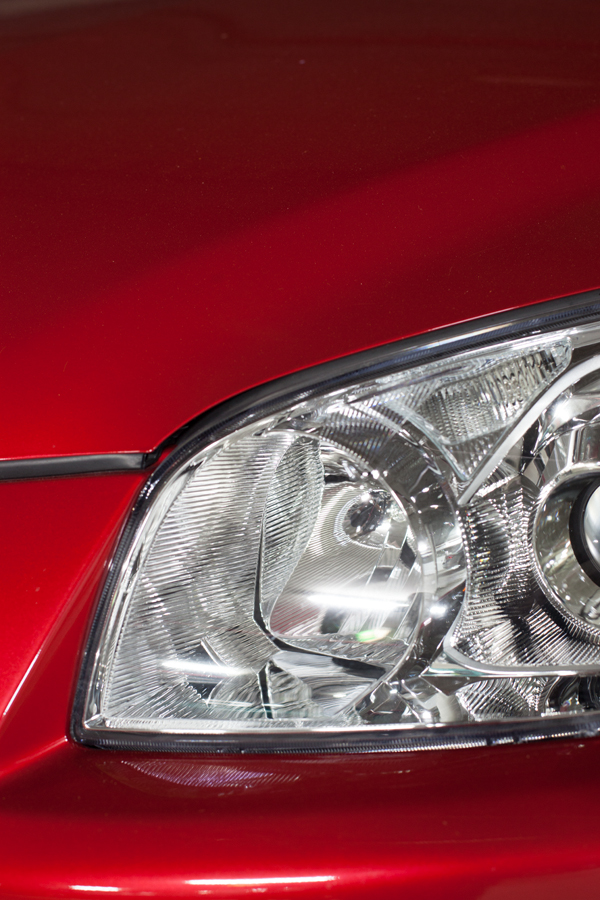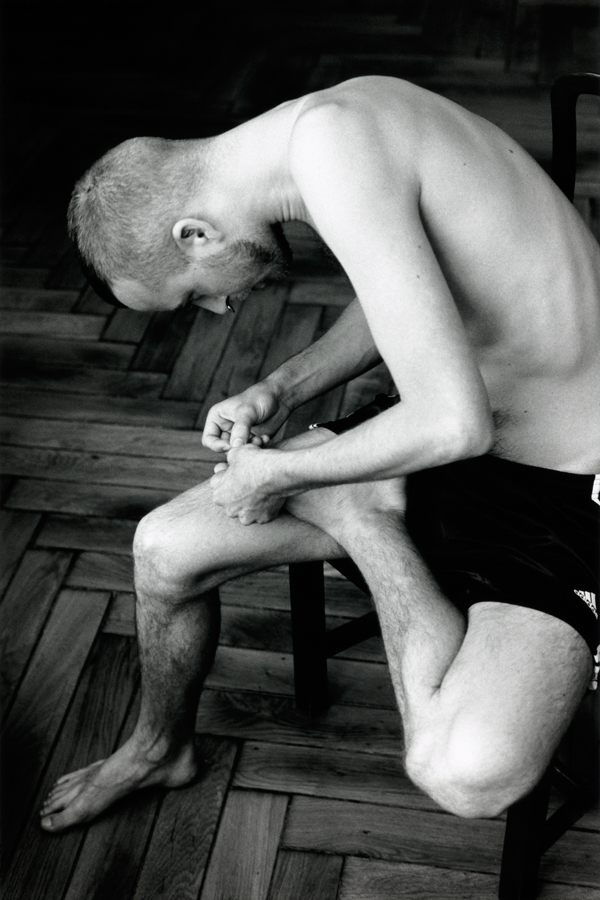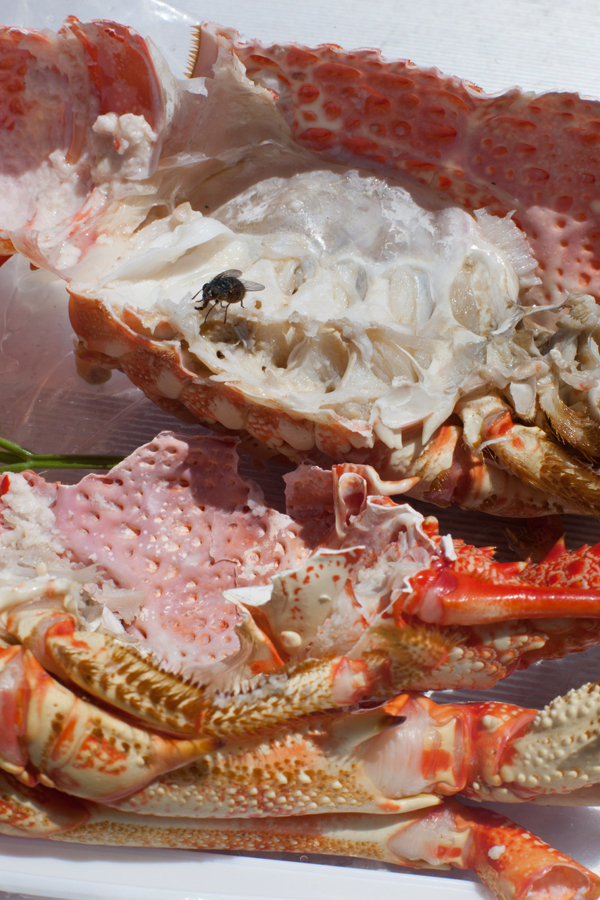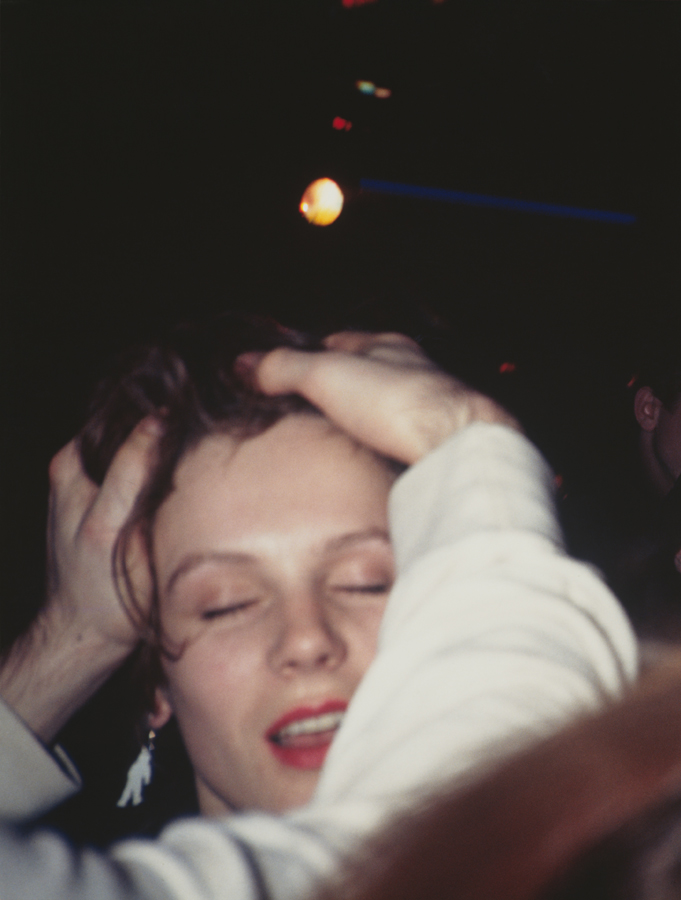An activation of materiality. A display of careful calculation. Grids and lines are followed in a non-conforming rhythm. Architecture is used as a curatorial device. An installation masterpiece. A photograph as a test. A photograph as a material object. A photograph as a sculptural object. Images untouched by digital manipulation. Welcome to two decades of Wolfgang Tillmans embodied under the title Fragile. Fragility apparent in both subject and material artefact.
Patient, yet enthusiastic spectators gather to consume the address by JAG’s curator-in-chief, Khwezi Gule, at the press opening of Fragile. As Gule leaves, Tillmans begins to guide his audience, manoeuvring eager bodies through the expanse of his show. Stepping into the first space you are frozen in your tracks by one of his most well-known works, Lutz & Alex sitting in the trees (1992) – a large-scale photograph of two figures, naked torsos exposed, finding minimal cover with their vinyl jackets loosely styled on their frames. But the amazement, appreciation and emotion that his works instil are yet to be explored by us, his immediate audience.
Tillmans invites his audience to interact with Sendeschluss/End of Broadcast by asking us to step closer to the black and white pixel image. Just close enough to prevent your face from touching the surface. And it is then revealed to the naked eye that this image is constructed of colour. This opening to the show, comprised of over 200 works spanning from 1986 – 2018, invites a word of caution from the artist, warning against first impressions, and encouraging a second look.
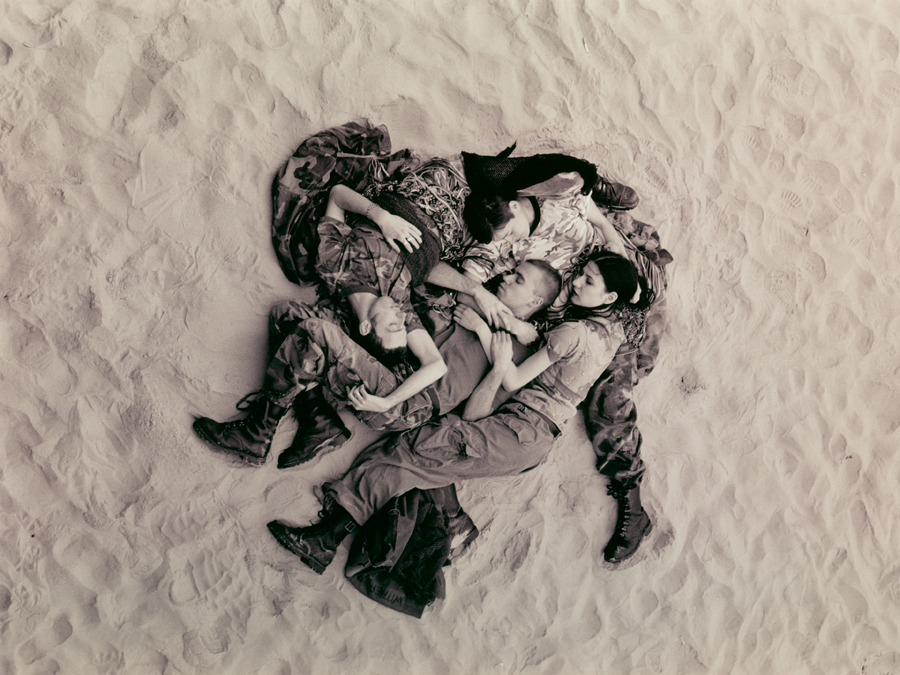
With work that holds an eminent position in the world of contemporary art, the artist is known for his perpetual redefining of the photographic medium as an artefact of materiality and as an image constructed by light. Led by an unquenchable curiosity, Tillmans navigates the world and reproduces that which he observes with his eye by occasionally placing a camera in front of it. His abstract works and more sculptural pieces include Paper Drop, the Lighter series (one of Tillmans’ very view series of work) and Freischwimmer / Greifbar. Through his experimental approach, Tillmans has developed the photographic medium, both the technical and aesthetic potentialities of the practice further.
Intimacy, compassion and familiarity translate in image form creating a tangible emotion. An observational modus operandi characterised by a humanist approach to the complexities of the world. Tillmans’ oeuvre comprises of his club culture photographs from the 1990s, abstract works that find their footing in extreme formal reductionism, images narrowing in on the beauty of the everyday, and depictions that display a rigorous perception containing a grounded socio-political awareness.
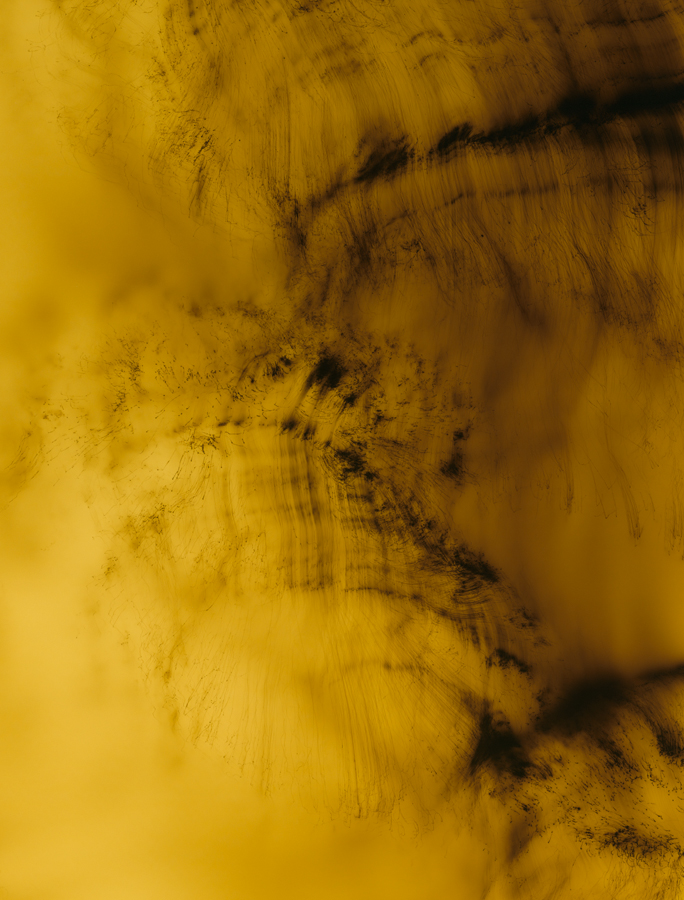
In discussion with the German photographer he elaborates on his interest in objects of the everyday and the narrative of his work by explaining that for him these objects are not necessarily banal objects. His train of thought continues to the value of such objects, “I’m very aware of the values potentially attributed to the things that I photograph, but want to leave the absolute values also quite open.” Explaining this statement through various examples of images in the exhibition, he ends off with the following trajectory, “I choose not to influence. I choose things to settle. It’s the narratives that are usually non-linear objects, and people and places in the pictures and installations. The narratives and associations are definitely more driven by challenging value systems.”
Reflecting on his work, Tillmans expresses that he does not see himself as a deconstructivist but rather leans towards what he refers to as a nostalgic modernist. “My way of installation at first glance is sort of not modernist but maybe actually it is because there is a certain purity and vigor and a trust in a linear development. Not just in atomization. It looks so super multi varied but actually there are, rhythms, there are recurring themes…”.
Contrary to tradition, Tillmans does not often work within the frame of series. After the act of taking his photograph, the need to recreate a similar image is worn. “Because I like to make work that is coming from an actual engagement with a subject matter in the here and now and not just from the idea that I should make another one like this.” Tillmans here refers to a feeling of intensity – an instinct to create. Over 30 years of photographing he now has “families of pictures”.
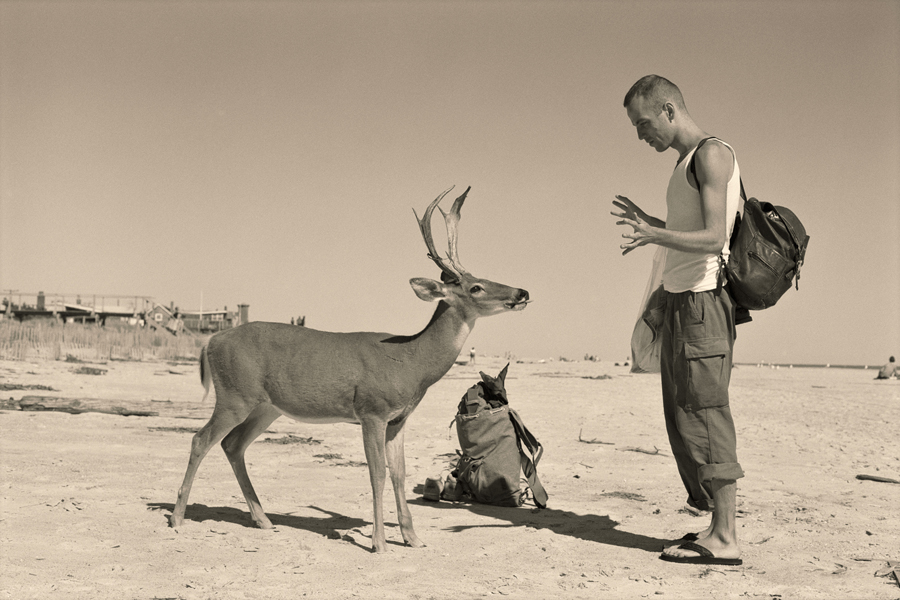
Connecting the works on display to fragility, Tillmans explains that Fragile fulfills the purpose of working as a title and is not a defining label in itself. There are however moments of fragility captured in an expression, in an emotion felt or in the medium of photography. Then there is the fragility of appropriating the world as can be seen in the work Truth Study Centre. Attracted to the economic nature of the photographic medium, Tillmans equally enjoys the ability it has to facilitate conversations around physically concrete and sculptural issues.
Tillmans sees the art as something that allows him to speak about the physical world and simultaneously penetrate something that is more psychological. “It’s so able to record emotions and relations and it can manipulate a lot and pretend a lot but used sensitively it is an incredibly psychological medium.”
What draws one to a Wolfgang Tillmans show is more than the images displayed, in part you are pulled by his curatorial method that becomes an artwork in itself. Looking back on his journey with curation, Tillmans explains that his current mode of display was not something which he had planned to be a recurring part of his practice. He states, “I didn’t plan to come up with a way of making art that would leave ultimately only myself to install the exhibitions and it ended up this way.” It was with his first exhibition in 1993 that he first employed this method of display resulting in curators asking him to bring forth his particular grammars and syntaxes in shows. “…it really is to try to represent the way how I look at the world. Which is not just ordered in sections and it’s not all in a line. It’s allowing different attitudes.”
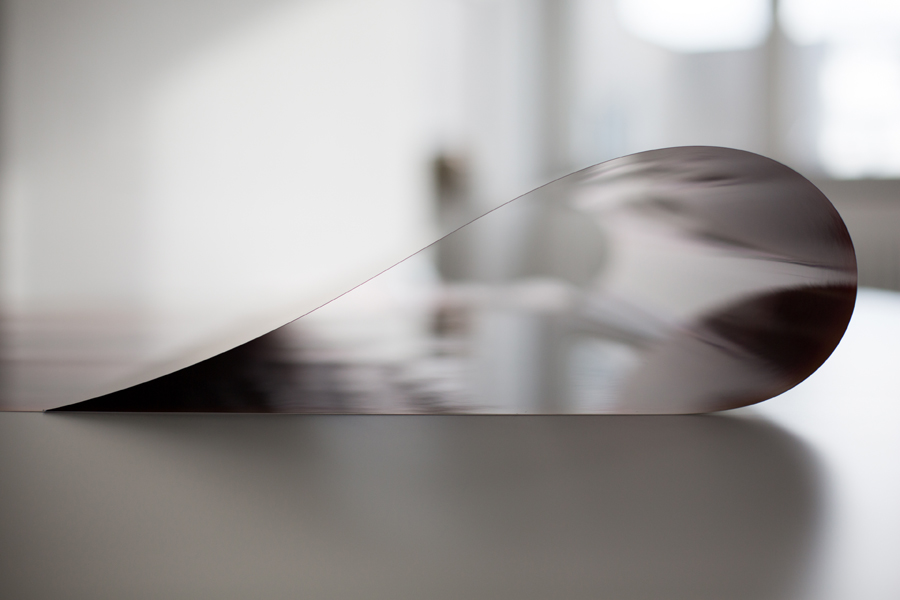
An agreement to the fragility that defines us as individuals and that influences our relations to one another is viewed as strength. Since his adolescence, Tillmans has been acutely aware of this interplay which is marked throughout the expanse of his artistic practice. Fragile has been used by Tillmans before, as an early artist name as well as the title of a music project he was involved in. Teasing out new ways of making with frailty, failure and rifts, these make reference to the imperfection of life and open up diverse perspectives on the materiality of the above.
Subjectivity with the potential to transform. Providing an extensive overview of his complex work this exhibition is a showcase of the various shapes of artistic expression of Wolfgang Tillmans. The show includes photography from large scale installations taking up an entire room, to small post card images and even smaller polaroids of 90’s party culture, publications, sculptural objects, video content and the installation practice particular to the artist. Activating discourse, an exchange of reaction takes place when presented with new scenarios. Space is given for mystery, deep emotion and speculation.
A sculptural practice wrapped around economy. An absolute awareness of the materiality of, not only his medium, but life itself. The deeply psychological nature of his portraits ingrained. To see as never seen before. Attending this show is a perception warp itself and a realization of fragility, a realization of your own inevitable fallibility and life span. If you enjoy walking out of your comfort it is definitely where you should be.
Wolfgang Tillmans: Fragile will run to the 30 September 2018 at the Johannesburg Art Gallery. I promise there is no regretting it.
